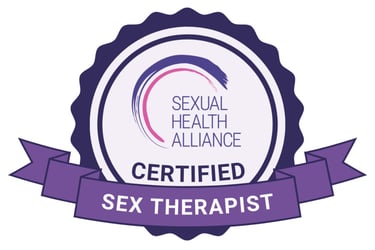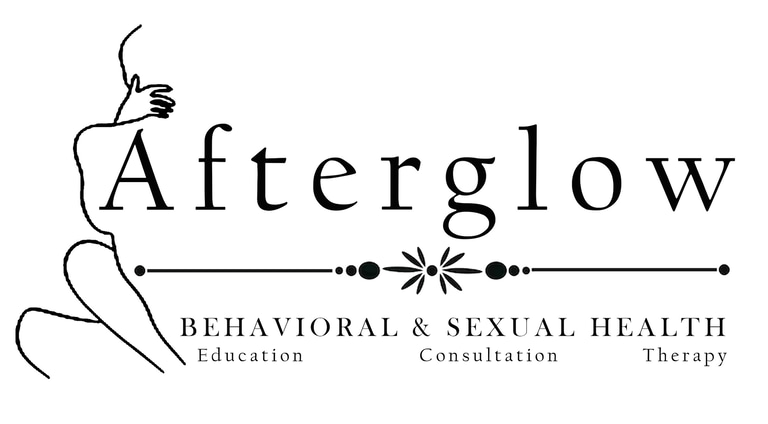Sexual Health & Body Image
Where Every Body is Worthy of Love, Pleasure, and Confidence
At Afterglow Behavioral and Sexual Health, we believe that body image isn’t just about how we look—it’s about how we feel, how we touch, and how we allow ourselves to be touched. When negative body image interferes with intimacy or sexual health, it can quietly erode our confidence, connection, and sense of self-worth.
Whether you're dealing with weight stigma, age-related changes, scarring, chronic illness, or feelings of disconnection from your body, you are not alone—and you are not broken.
We use a unique, compassionate framework developed by Dr. Kent in 2014 called The Wabi-Sabi Body™ to help people embrace the natural evolution of their bodies and rediscover the joy of connection—both with themselves and others.






The Hidden Link: Body Image and Sexual Health
Body image plays a critical role in shaping sexual health, with negative perceptions of one’s body strongly linked to reduced sexual satisfaction, desire, and functioning. Research published in the Journal of Sex Research (2020) found that individuals with poor body image were twice as likely to report low sexual desire and three times more likely to avoid sexual activity altogether. This avoidance is not rooted in a lack of interest, but in fear of judgment, shame, or discomfort with being seen. Another study in Body Image (2018) showed that over 60% of adults reported body-related anxiety during intimacy, which directly interfered with their ability to feel aroused, present, or emotionally connected. These concerns extend beyond weight to include scars, stretch marks, skin conditions, aging, and mobility devices—any aspect of the body that deviates from cultural ideals.
This internalized discomfort affects not only individual sexual functioning but also relational dynamics. Partners may misinterpret avoidance as rejection, further complicating intimacy. A 2022 review in Sexual Medicine found that people with more positive body image reported greater frequency of sexual activity, more orgasm consistency, and higher levels of relationship satisfaction. Conversely, those with negative body image were more likely to experience performance anxiety, reduced responsiveness, and disconnection during sex. Importantly, these patterns held true across gender, age, and ability. Addressing body image as part of sexual health care is not cosmetic—it’s foundational. Frameworks like Afterglow’s Wabi-Sabi Body model support individuals in moving beyond perfectionism, helping them access pleasure through acceptance, embodiment, and curiosity, rather than appearance-based validation.
Negative body image doesn’t just affect how we dress or pose in photos—it often bleeds into our sexual lives in ways that are difficult to name. Many people silently suffer with:
Shame or anxiety during intimacy
Avoidance of sex or undressing in front of a partner
Difficulty becoming aroused or achieving orgasm
Disconnect between desire and bodily responsiveness
Hyperfocus on "flaws" that block pleasure and presence
Emotional distress during or after sex
At Afterglow, we don’t just treat the physical symptoms of sexual dissatisfaction—we explore the emotional and psychological layers that make sexual healing possible.
The Wabi-Sabi Body: Finding Beauty in the Imperfect, Impermanent, and Incomplete
Wabi-sabi is a Japanese aesthetic and life philosophy that finds beauty in what is natural, aged, asymmetrical, and weathered by time. At Afterglow, we apply this gentle, healing lens to body image and sexuality.
Through the Wabi-Sabi Body framework, we help you:
Let go of the pressure to “fix” your body in order to feel worthy
Reframe scars, stretch marks, wrinkles, and softness as signs of life lived—not flaws
Develop a deeper emotional and sexual connection with your body as it is
Release perfectionism and allow intimacy to become more about feeling than performing
Shift from self-criticism to self-compassion in your erotic experiences
Your body doesn’t need to be “better” to be deserving of touch, desire, or love. It only needs to be yours.
A Safe Place to Explore Without Shame
Exploring sex and body image without shame is vital to fostering authentic sexual wellness, yet many individuals internalize negative cultural messages that hinder this connection. Research published in the Journal of Sex Research (2019) found that individuals with higher levels of body shame were 3.4 times more likely to experience sexual inhibition, particularly around undressing, initiating intimacy, and expressing desire. Shame disrupts presence during sexual activity and encourages self-monitoring rather than embodied enjoyment, leading to lower rates of arousal, satisfaction, and orgasm. This pattern is compounded by societal pressures—such as unrealistic body standards in media—which contribute to feelings of unworthiness and sexual avoidance. When people are taught to view their bodies as flawed, they often believe they must “fix” themselves before they can be sexual, delaying or denying pleasure altogether.
Conversely, reducing shame and building body confidence directly improves sexual well-being. A 2020 study in Body Image found that people who practiced self-compassion and body neutrality—acknowledging their bodies as valuable without focusing on appearance—reported significantly higher levels of sexual self-esteem and frequency of pleasurable sexual activity, regardless of body size, scars, disability, or age. Furthermore, those who participated in body-positive or mindfulness-based interventions experienced up to a 50% reduction in sexual anxiety over a 6-month period (Archives of Sexual Behavior, 2021). Creating spaces where people can explore sex and body image without judgment—like Afterglow’s The Wabi-Sabi Body™ approach—allows for healing, curiosity, and connection. It invites individuals to shift from asking, “Do I look good enough?” to “How do I want to feel in my body?”—a transformation that replaces shame with agency and opens the door to deeper, more fulfilling intimacy.
Afterglow was founded as a space where people could heal their relationship with their bodies and reclaim their right to sexual joy. Our team is trained in body-inclusive, trauma-informed, and LGBTQ+ affirming approaches to care.
We offer:
Individual sexual health and body image therapy
Couple’s intimacy sessions
Somatic and mindfulness-based practices to reintroduce pleasure and connection
Tools to reduce sexual performance anxiety
Education and support rooted in body acceptance—not appearance-based validation
You don’t need to wait until your body changes to start feeling good in it. You can begin now.
Reconnect, Rekindle, Reclaim
Reconnecting with your body is often the first step toward reclaiming sexual confidence—especially for individuals who have experienced illness, trauma, or long-standing body dissatisfaction. A 2021 study published in the Journal of Sex & Marital Therapy found that people who engaged in regular body-awareness practices—such as sensual movement, mirror work, or mindfulness—reported a 42% increase in body appreciation and a 35% improvement in sexual satisfaction within just 8 weeks. These practices help individuals shift attention from perceived flaws to lived sensation, reducing internalized shame and allowing space for curiosity and pleasure. Importantly, body reconnection doesn’t require “fixing” the body; rather, it’s about recognizing its resilience and fostering trust in its capacity to give and receive pleasure—no matter its shape, scars, or abilities.
Rekindling sexual confidence requires a similar reframing. Research from Archives of Sexual Behavior (2020) showed that individuals who redefined intimacy based on emotional connection and self-expression—rather than performance or appearance—reported significantly higher levels of desire, orgasm consistency, and partner closeness. Reclaiming this confidence is not about returning to a former version of oneself, but about embracing the current body with compassion, adaptability, and pride. In marginalized populations—including those living with disabilities, chronic illness, or in larger bodies—sexual confidence is often buried under years of silence and stigma. Programs like Afterglow’s The Wabi-Sabi Body™ framework center this reclamation, guiding people to embrace their whole story—not despite their changes, but because of them. It’s through this reconnection that sexual confidence becomes not just possible, but powerful.
You may have spent years trying to shrink your body, hide it, ignore it, or punish it. But you can choose something different now. You can learn to experience your body, not just critique it. You can find joy in movement, softness in connection, and freedom in letting yourself be seen—flaws, fears, and all.
That’s the promise of The Wabi-Sabi Body™. That’s the healing we foster at Afterglow.

Get More Informatin or Schedule Today
Connect with us
© 2025. All rights reserved.
dr.kent.sexhealth@gmail.com


